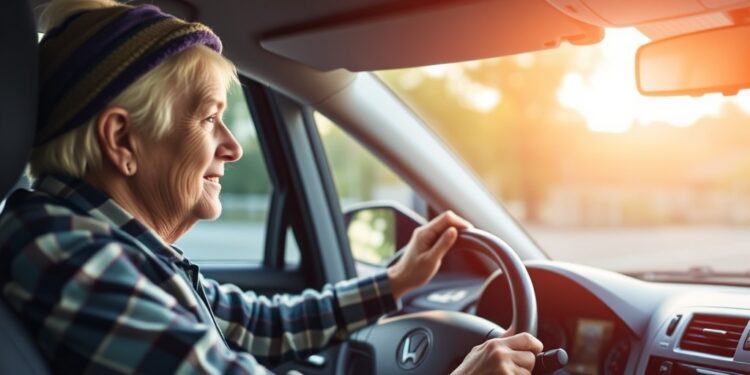How GPS Technology Enhances Safe Driving for Older Adults
As the population ages, the importance of travel independence for older adults has become more evident. A recent investigation conducted by researchers at the University of East Anglia has shed light on an innovative solution for seniors facing challenges with navigation. This groundbreaking observational study reveals that GPS navigation systems, such as Sat Navs and smartphone applications, play a pivotal role in allowing older drivers to extend their mobility on the roads.
With the average age of participants being 71 years, the study involved 895 drivers above the age threshold of 65, including 514 women. One of the significant findings is that older adults with a diminished sense of direction relied heavily on technological assistance for navigation. This dependency on GPS is not a mere convenience, but a crucial assistance that fosters driving frequency among seniors. The results suggest that reliance on GPS tools helps maintain their driving independence — a vital component not only for mobility but also for overall psychological well-being.
The decline in cognitive abilities as people age often leads to challenges in spatial awareness and orientation. Consequently, many older adults report increased anxiety about driving, especially in unfamiliar environments. This can discourage them from driving altogether, exacerbating feelings of isolation and reduced quality of life. The research team, consisting of experts from various institutions, including the University of Exeter, attained a comprehensive understanding of how technological navigation aids can alleviate these cognitive stresses.
Lead author Dr. Sol Morrissey emphasized the impact of GPS systems on cognitive load. He stated that such devices relieve the mental burden associated with navigation, particularly when exploring new destinations or areas with complex layouts. The data collected from participants included self-reported driving habits, the frequency and duration of their trips, as well as specific instances where GPS was utilized. This comprehensive data collection allows for an in-depth analysis of the relationship between the use of GPS technology and driving behavior.
Moreover, when examining the cognitive tests submitted by participants, the correlation between memory, spatial abilities, and GPS reliance became increasingly evident. Those who frequently utilized navigation aids exhibited greater driving mobility compared to those who did not engage with these technologies. The ability to navigate confidently can deter feelings of apprehension, allowing older drivers to embrace travel opportunities and maintain their routines.
Research shows that driving does not merely serve as a means of transportation; it heavily influences autonomy and self-esteem among older individuals. Societal norms often view driving as a rite of passage, constituting more than just the ability to move from point A to point B. Therefore, ensuring that seniors can maintain their mobility without fear or confusion strengthens their connection to the community and enhances their quality of life.
Professor Michael Hornberger from UEA’s Norwich Medical School addressed the importance of this study, asserting that effective support systems utilizing GPS technology can prolong safe driving experiences for older adults. Encouraging the integration of such technologies in daily commutes can significantly improve their independence and overall mental health. The findings reiterate the necessity of equipping seniors with the tools they need, promoting more empowered behaviors in navigating their environments.
Collaboration played a significant role in this research, with partnerships extending to the University of Exeter, Oxford Brookes University, Chester Wellness Centre, and the University of Leeds. The multidisciplinary approach underscores the complexity of driving and cognitive health as it pertains to aging populations. Understanding the various factors that support the mobility of seniors is crucial, especially in light of the increasing number of older individuals on the roads.
As GPS technology advances, it opens pathways toward innovation in transportation safety. User-friendly interfaces designed specifically for older adults can further optimize navigation experiences, making driving safer and less intimidating. Encouraging the utilization of these systems can help stave off fears associated with lost spatial awareness, thereby promoting regular driving habits among seniors.
While the research is specifically focused on the UK demographic, its conclusions have far-reaching implications for aging populations worldwide. As countries contend with rising percentages of elderly drivers, understanding their needs and adjusting accordingly is critical. By recognizing how technologies can seamlessly integrate into daily life, society can not only enhance the driving experience but foster a sense of community and belonging among older adults.
Understanding the role of such innovations can lead to new policies that both protect the rights of older drivers and encourage continued engagement in societal activities. Greater emphasis on education regarding safe driving practices and the effective use of ever-evolving GPS technologies may support public health initiatives. Studies like this will continue to inform best practices aimed at ensuring that older adults can navigate their environments with confidence and safety.
In summation, embracing technology as an ally in sustaining mobility for older adults is paramount. By supporting them in learning and utilizing GPS navigation tools, we can facilitate safer driving solutions and promote enduring independence within this demographic. Continuing to explore and develop these resources will pave the way for a more inclusive transportation future for all.
Subject of Research: People
Article Title: GPS navigation assistance is associated with driving mobility in older drivers
News Publication Date: 3-Apr-2025
Web References:
References:
Image Credits:
Keywords: GPS, older drivers, navigation technology, cognitive health, mobility independence, driving safety, aging population




